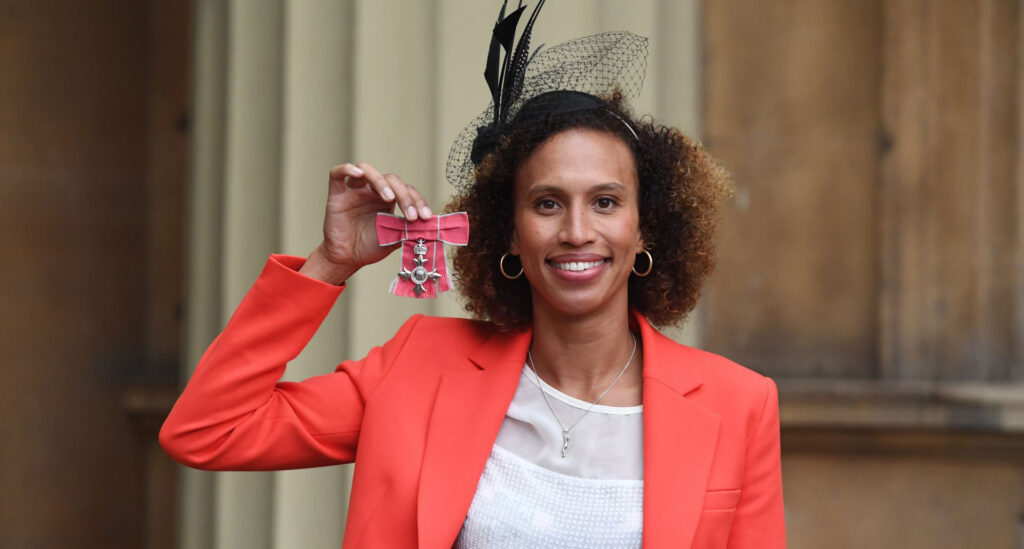Following the recent news of her retirement from netball, the former England captain is set to begin her new position as a Special Advisor and Coach at Ayming – a leading organisation in the business performance sector. Guthrie will work within the People, Performance, and Development (PPD) team, with a focus on people development – involving everything from one-to-one coaching, to running workshops and leading ILM courses.
Whilst Guthrie isn’t the first athlete to transfer her sporting expertise to the business world, her holistic approach and views on shared ownership and people empowerment, set her apart from many of her contemporaries.
Did you always picture yourself coaching outside of sport? What was it about Ayming and this specific position that appealed to you?
One element of sport that I’ve always loved is being able to work with people, so I always knew that whatever role I took on outside of sport would be people focused.
Ayming is clearly a people-centric business that takes personal development seriously, both internally and for our clients. I’m really looking forward to being part of a company that prioritises its people and understands the difference this can make to individual wellness, as well as business success.
How do you think that your sporting experience will help with your coaching role, and what do you think are the main differences between leadership as a player and as a coach?
The best leaders are authentic – whether that’s leading as a coach or as a player.
Building a positive team culture is something that I’m looking to bring with me into this next phase of my career, and I think that my experience on the courts working in high-pressure scenarios arms me with a strong understanding of what a lot of businessmen and women experience on a day-to-day basis.
What would you say are the key areas of your coaching process?
For me, the fundamentals of coaching lie in the acknowledgement that within the systems and businesses we operate, we’re all interconnected. Having this holistic approach to coaching has really helped me to get the best out of a group by getting the best out of individuals.
Your sporting background clearly gives you a unique perspective that most coaches won’t have, what do you think other coaches can learn from the experience and insight of elite athletes like yourself?
The intersection between sport and business is enormous.
So many of the challenges people and teams face in business can be mirrored in the challenges athletes face over the course of a match or a race, whether that be resilience when things aren’t going well, or simply the act of driving towards a shared objective with the wider members of your team.
My experience tells me that there is huge value in creating a positive culture and looking for meaning in what teams are looking to achieve, and then leading with those goals in mind.
Laura Overton recently wrote a piece in which she discussed how L&D professionals should be trying to learn from the mental discipline and winning mentality of athletes. Is that something you agree with? And how would you go about trying to introduce that sort of culture outside of a sporting environment?
Definitely. A winning mentality is something you develop through the ups and downs of a career in sport, just as one does in business. But achieving that mindset takes time, and while it’s great to use athletes to develop workshops and explore their successes and failures to gain understanding, ultimately, it’s highly individual.
I believe we must look within and dig into the motivation of individuals and teams as we look for ways to improve.
Which coaches did you most enjoy playing under, and are there any specific areas of their coaching processes that you’ll be looking to use within this role?
My favourite coach to play under was Julie Fitzgerald in Australia. She never spoke about specific tactics, but rather wanted us to operate under a set of principles that she allowed the team to carve out ourselves. This shared ownership made us a difficult team to beat because the buy-in was so strong that we could adapt to any challenge thrown at us.
Traditionally, coaching has been reserved for those within leadership positions, but recently there appears to be a shift to it becoming more inclusive – how important do you think this shift is for the profession? And more generally, which direction do you see the future of coaching heading in?
Leading provides an opportunity to make a difference and move an organisation and its followers forward – ultimately inspiring others to do the same. It’s true that some people are born with an innate ability to inspire and lead those around them, and I don’t think that’s ever going to change – but I do believe that leadership should never be monopolised.
Fortunately, these days more leadership is being shared around within businesses. We’re learning that there’s more than one way to get the best out of people and successfully lead a group.
I think that everyone has the capacity to learn to lead, but it’s so individual. It’s not about imitating someone else, it’s about cultivating a leadership style that suits you.
What is critical is that organisations equip people with the right tools to make sure they’re prepared for leadership opportunities when they arise.
Following the recent news of her retirement from netball, the former England captain is set to begin her new position as a Special Advisor and Coach at Ayming – a leading organisation in the business performance sector. Guthrie will work within the People, Performance, and Development (PPD) team, with a focus on people development – involving everything from one-to-one coaching, to running workshops and leading ILM courses.
Whilst Guthrie isn't the first athlete to transfer her sporting expertise to the business world, her holistic approach and views on shared ownership and people empowerment, set her apart from many of her contemporaries.
Did you always picture yourself coaching outside of sport? What was it about Ayming and this specific position that appealed to you?
One element of sport that I’ve always loved is being able to work with people, so I always knew that whatever role I took on outside of sport would be people focused.
Ayming is clearly a people-centric business that takes personal development seriously, both internally and for our clients. I’m really looking forward to being part of a company that prioritises its people and understands the difference this can make to individual wellness, as well as business success.
How do you think that your sporting experience will help with your coaching role, and what do you think are the main differences between leadership as a player and as a coach?
The best leaders are authentic – whether that’s leading as a coach or as a player.
Building a positive team culture is something that I’m looking to bring with me into this next phase of my career, and I think that my experience on the courts working in high-pressure scenarios arms me with a strong understanding of what a lot of businessmen and women experience on a day-to-day basis.
What would you say are the key areas of your coaching process?
For me, the fundamentals of coaching lie in the acknowledgement that within the systems and businesses we operate, we’re all interconnected. Having this holistic approach to coaching has really helped me to get the best out of a group by getting the best out of individuals.
Your sporting background clearly gives you a unique perspective that most coaches won’t have, what do you think other coaches can learn from the experience and insight of elite athletes like yourself?
The intersection between sport and business is enormous.
So many of the challenges people and teams face in business can be mirrored in the challenges athletes face over the course of a match or a race, whether that be resilience when things aren’t going well, or simply the act of driving towards a shared objective with the wider members of your team.
My experience tells me that there is huge value in creating a positive culture and looking for meaning in what teams are looking to achieve, and then leading with those goals in mind.
Laura Overton recently wrote a piece in which she discussed how L&D professionals should be trying to learn from the mental discipline and winning mentality of athletes. Is that something you agree with? And how would you go about trying to introduce that sort of culture outside of a sporting environment?
Definitely. A winning mentality is something you develop through the ups and downs of a career in sport, just as one does in business. But achieving that mindset takes time, and while it’s great to use athletes to develop workshops and explore their successes and failures to gain understanding, ultimately, it’s highly individual.
I believe we must look within and dig into the motivation of individuals and teams as we look for ways to improve.
Which coaches did you most enjoy playing under, and are there any specific areas of their coaching processes that you’ll be looking to use within this role?
My favourite coach to play under was Julie Fitzgerald in Australia. She never spoke about specific tactics, but rather wanted us to operate under a set of principles that she allowed the team to carve out ourselves. This shared ownership made us a difficult team to beat because the buy-in was so strong that we could adapt to any challenge thrown at us.
Traditionally, coaching has been reserved for those within leadership positions, but recently there appears to be a shift to it becoming more inclusive – how important do you think this shift is for the profession? And more generally, which direction do you see the future of coaching heading in?
Leading provides an opportunity to make a difference and move an organisation and its followers forward – ultimately inspiring others to do the same. It's true that some people are born with an innate ability to inspire and lead those around them, and I don’t think that’s ever going to change – but I do believe that leadership should never be monopolised.
Fortunately, these days more leadership is being shared around within businesses. We’re learning that there’s more than one way to get the best out of people and successfully lead a group.
I think that everyone has the capacity to learn to lead, but it’s so individual. It’s not about imitating someone else, it’s about cultivating a leadership style that suits you.
What is critical is that organisations equip people with the right tools to make sure they’re prepared for leadership opportunities when they arise.





